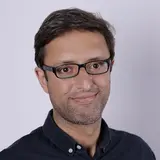The first event is on Wednesday, 16 October, at 6.15 pm. Dr Christiane Czygan from the Orient-Institut Istanbul will speak about "Contextualising the Hamburg Divan Manuscript by Sultan Süleyman the Magnificent (1554)". Sultan Süleyman (reigned 1520–1566) was one of the most productive Ottoman rulers and poets. To date, 41 collections of his poems are known, but they have remained largely unexplored, especially the copies that circulated outside Istanbul. Like other manuscripts from this period, the Hamburg manuscript was forgotten for almost a century until Petra Kappert discovered it in the library vaults of the “Museum für Kunst und Gewerbe” Hamburg. It was one of the first illuminated copies of the Divan to be produced by outstanding artists in the studio of the Imperial Palace. In her lecture, Dr Christiane Czygan will talk about how this copy of the Divan converged with and diverged from other copies, highlighting the special nature of the Hamburg manuscript.
The lecture "The Motives behind Oskar Rescher's Manuscript Trade" by Professor Güler Doğan Averbek from Marmara University Istanbul will continue on 30 October, also at 6.15 pm.
On Wednesday, 27 November at 6.15 pm, Dr Bruno De Nicola from the Austrian Academy of Sciences Vienna will speak on "Persian Manuscripts from Mongol Baghdad: A Survey".
And the last event of the year is on 4 December. Professor Dr Sarah Bowen Savant from the Aga Khan University London will be talking about "Reading Arabic Books with a Reuse Lens".
We encounter manuscripts in various academic fields, in philology, history, art history, theology and religious studies, library and museum studies, translation and translation research, even in the natural sciences (e.g. radiocarbon dating) and in computer science (e.g. digital humanities). Wherever manuscripts are included in research, they change the view of the relevant fields, consolidate or modify bodies of knowledge and present researchers with challenges of all kinds.
The "Gotha Manuscript Talks" offer the opportunity to discuss with researchers how specific manuscripts have changed the view of research objects, for example. Using manuscripts written in Arabic, Persian, Turkish-Ottoman, Syriac, Ethiopian, Hebrew and many other "oriental" languages, they trace stories of the reception of knowledge, but also stories that tell of forgetting. The "Manuscript Talks" deal, for example, with historical or literary developments that become tangible in manuscripts, with theological problems that are revealed or solved through them, with transmission processes, social and intellectual networks, artistic and museum practices, economic developments and many other social and intellectual phenomena at the centre of which are oriental manuscripts. For manuscripts shed light on patrons, authors, copyists, illuminators, translators, dealers, bibliophiles, buyers, owners and antiquarians, both in the main text and in the secondary notes, in their design and their craftsmanship.
All interested parties are cordially invited to take part in the events – under the link https://uni-erfurt.webex.com/meet/veranstaltungen.fb. After a 45-minute lecture, there will be an opportunity for discussion. If you miss an event, you can watch it afterwards in the media centre.


